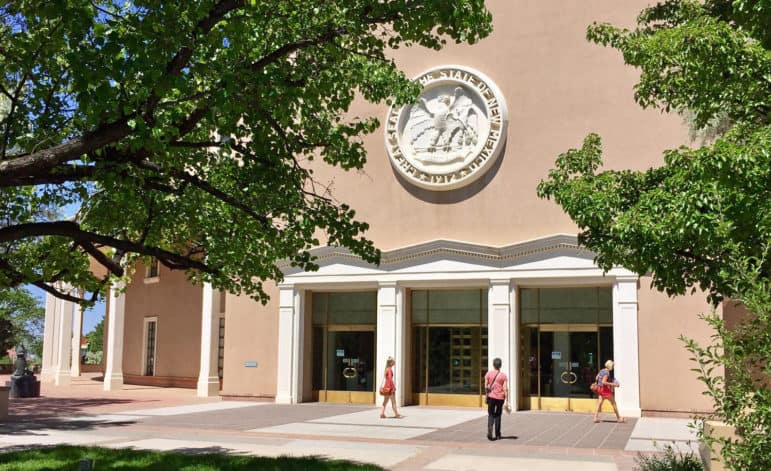
Heath Haussamen / NMPolitics.net
The Roundhouse in Santa Fe.
Following three hours of impassioned testimony and debate, the state House of Representatives late Wednesday voted 40-29 to repeal a 50-year-old law that made it a fourth-degree felony to perform an abortion in New Mexico.
Although a 1973 U.S. Supreme Court decision rendered the law unenforceable, arguments over removing the statute from the books reflected continuing discord in the nation between pro-choice advocates and pro-life supporters over the question of who should have the right to decide whether a woman should have an abortion — the individual or the state.
“This respects a woman’s personal decision to have an abortion,” said Rep. Joanne Ferrary, D-Las Cruces, one of five Democrats who sponsored House Bill 51.
But members of the Republican minority in the House disagreed, citing concerns about the possibility of unsafe late-term abortions of living fetuses and battling over a section of the bill that repeals a “conscience” clause allowing medical practitioners to refuse to take part in an abortion procedure for moral or religious reasons.
“You are perfectly willing to allow hospitals and medical practitioners… to refer or provide abortion services even if their conscience tells them they cannot do that?” House Minority Whip Rod Montoya, R-Farmington, asked Ferrary at one point.
Abortion rights advocates are concerned that the federal courts could undermine or overturn the U.S. Supreme Court’s landmark Roe v. Wade decision that made performing an abortion legal. Proponents of the bill worry that the law criminalizing abortion might become enforceable again if the new conservative majority on the U.S. Supreme Court overturns Roe v. Wade.
Those concerns may have been further stoked by President Donald Trump’s denouncement of late-term abortions in his State of the Union address Tuesday night.
The New Mexico bill would repeal parts of existing state law, including the 1969 statute that makes it a felony to perform an abortion.
The bill also lays out a process for approving a “justified medical termination” as in the case of rape, or if a child would be born with a grave physical or mental defect, or in order to save the mother’s life.
Still, even in those cases, an abortion would have to be approved by a special board at a hospital where the abortion would be performed.
Another section of the bill would repeal a section of law that allows hospitals and medical personnel the right to refuse to participate in an abortion if they object to the procedure on moral or religious grounds.
Ferrary said federal law protects those medical professionals, but Montoya countered by citing a court case involving a worker at New York City’s Mt. Sinai Hospital who was forced to take part in abortion despite the vows of her superiors that she would never have to do that.
Montoya said constituents have been calling and e-mailing him expressing concerns that the state would allow an abortion “up to the very day of birth, whether or not it’s a medical necessity.”
Ferrary said federal law allows for a woman to choose to have a late-term abortion if there are medical problems or challenges. But Montoya claimed such late-term abortions are taking place in the state regardless of circumstances.
Other Republican lawmakers spoke out against the bill, asserting that the life of the unborn is more important than an individual’s right to choose.
Said Rep. Cathrynn Brown, R-Carlsbad, “The only person who benefits from abortion is an irresponsible male.”
Meanwhile, Democratic lawmakers related personal stories of friends, acquaintances or others they know who made the decision to have abortions because of personal or medical problems.
Rep. Debra Sariñana, D-Albuquerque, said she was raised as a Roman Catholic but changed her mind on abortion rights after seeing a pregnant 12-year-old girl.
“It was like a baby carrying a baby,” she said. “We must leave this decision to New Mexican women, their families and their medical providers.”
No House lawmakers were allowed to avoid voting on the controversial bill. That’s because about half-way through the debate, when various representatives from both political parties began wandering about and off of the House floor, Montoya asked for a “Call of the House.” That means that all representatives had to return to the floor to listen to the debate and vote. It took House aides about ten minutes to round up the missing legislators.
Six Democrats joined 23 Republicans in voting against the bill, with Rep. Paul Bandy, R-Aztec, absent. The six Democrats included Reps. Anthony Allison of Fruitland, D. Wonda Johnson of Church Rock, Patricia Lundstrom of Gallup, Patricio Ruiloba of Albuquerque, Joseph Sanchez of Alcalde and Candie Sweetser of Deming.
The bill will move to the Senate for more committee hearings and debate. Gov. Michelle Lujan Grisham has made it clear that she would sign any legislation eliminating the 1969 state law.